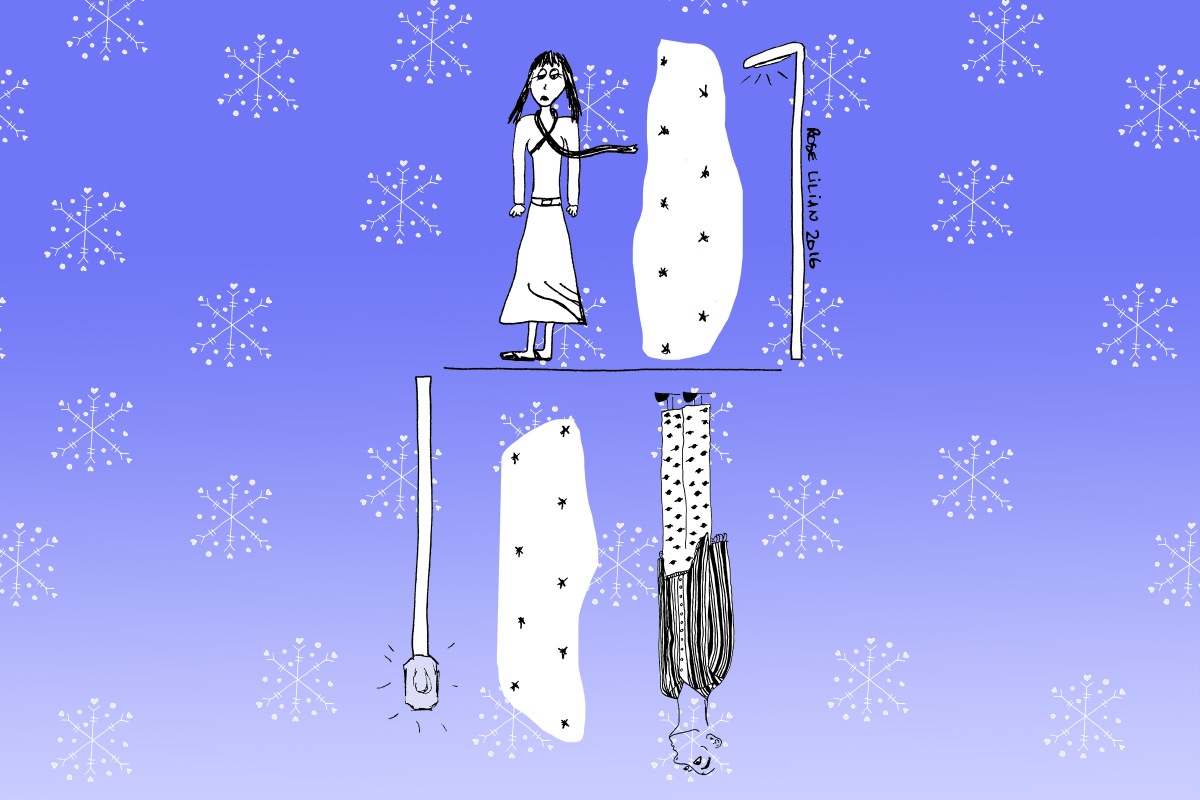Where ideas alight. A haven for short stories, sketches and other tiny stuff.



It is strange how things repeat themselves, especially when you’re so certain that they won’t.
Like when you go to the fish and chip shop on a Monday night and find it closed.
‘We’ll remember next time,’ you say to each other, thinking you’ll never forget standing out in the cold, peering through the windows into the empty displays that usually house fresh fish. Your stomach growls as if in confirmation: it is as angry as your brain at your stupidity.
Because this isn’t the first time you’ve done this.
Six months ago, you found yourself outside the fish and chip shop on a Monday. It was late, and you were hungry. ‘We’ll remember next time,’ you all said, ‘for sure.’
But you didn’t.

It is not pleasant to look back at holiday snaps you thought were excellent only to notice that next to you stands a sunburned old man peeling dried skin from his forearm, a woman scratching an infected mosquito bite, or a young boy picking his nose.
It is enraging, until you consider all the cities you’ve visited and all the times you’ve accidentally stood in somebody else’s photos, fixing your hair or scowling at your spouse.
This thought takes hold of you, and thereafter you find yourself looking upon the strangers hovering in your backgrounds—even the young boy picking his nose—almost fondly, as you remind yourself: I am a tourist, too.

Do you have a pet fish? the leggy lady asked the mermaid.
Yes, I have a smelt whose name is Salty, and a pufferfish called Yoyo.
Yoyo?
Like yoyo dieting—one moment he’s skinny, the next he’s fat.
Mermaids use that word too?
O, yes. We gain weight very easily, especially when trading with sailors in the summer months. During winter, when we receive few visitors, we are restricted to fish.
Eating fish… isn’t that like eating your pets? Or even your own kind?
No, fish come to us when they are old and offer themselves as sacrifice.
Like you’re gods!
In a way.
I would love to have a pet pufferfish.
The mermaid shrugged. Seals are better, she said.
Seals!
They are like your dogs. Dutch sailors have a good name for them: zeehond—literally, seadog. But they are much harder to acquire.
Why?
Because they choose you.
You’re so lucky, the lady said as she looked down at her thin, scarred legs.
The mermaid suddenly tossed her hair. I must go, she said. I have to find Grumpy.
Grumpy?
My shark.
Wait—I have one more question.
Yes?
What about your children?
What about them?
How—I mean—are babies easy to bare?
We don’t have babies—think of our figures! There’s a reason you don’t see pregnant mermaids. We lay eggs, only we call them bubbles, like any sensible fish.
How many—um—bubbles?
Thousands, though only a finful reach adulthood.
Oh.
How many children do you have?
The lady lowered her eyes. None, she said.
Pity, said the mermaid, easing back into the water.
Will you visit again?
Maybe, depends on my tides.
Your tides?
My mood, said the mermaid. And with a flick of her fins she vanished beneath the waves.
The lady watched the sea until the sun sunk below the horizon. Then she slowly traced the track back over the dunes.
Moments later, my own feet followed, crushing the prints she had made with her small toes.
I watched as she entered a weatherboard house, gently closing the door behind her. After a minute, steam billowed from an open skylight and I could hear the sound of running bathwater.

She has noticed that couples shape each other like a river working at stone (if the stone could work back) and she is not sure she likes the way she is being shaped (or the way she is shaping).

She finds couches offensive. The notion that she is to park her ass on a piece of furniture, that it will support her and comfort her throughout the day, is ludicrous.
Her husband tells her to just sit, she is blocking the television.
She erupts, he has no idea what it is like, he cannot imagine the stress she endures at home with the couch, let alone when visiting other people’s houses where they expect to her to sit on their couches like it is not extraordinary.
He yells that perhaps she should not visit other people’s houses, that she should sit at home and bake and sew, like a good wife.
She screams that they are not living in bloody caveman times.
He says, no they are not living in bloody caveman times, because if they were living in bloody caveman times there would be no couches.

I
In Amsterdam, a man teases pigeons, throwing leaves like they are food and smirking as the pigeons chase after them, waiting for the birds to bite and taste nothing, as he has tasted nothing his entire life.
II
In Siena, a child is kicking an old loaf of bread across the piazza, aiming his foot so that the hard, stale bread strikes a pigeon with each kick. He is overheard yelling ‘I got it! I got it! Right in the head!’
III
We watch these people grow from pigeon-tormenting youths into pigeon-despising adults—or something worse—and become depressed.
IV
But in a future world we see these people reincarnated as pigeons, and are then satisfied.
V
But, in an even farther future world, we see that the most advanced creatures living on the planet are, in fact, pigeons, and once again, become depressed.